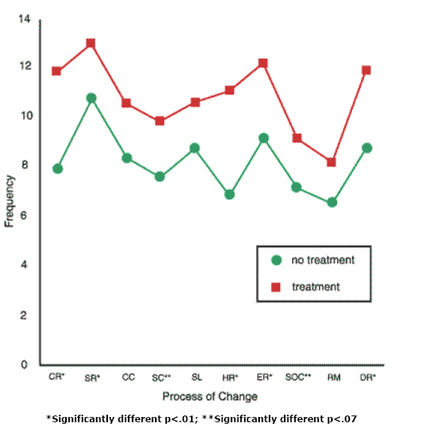The WAGER, Vol 6(26) – Gambling Treatment and the Processes of Change
The transtheoretical model of change describes the process of behavioral change (Prochaska et. al, 1988). The model consists of three constructs: stages of change, processes of change, and levels of change. Hodgins (2001) studies the processes of change construct with regard to problem gambling resolution.
Hodgins & el-Guebaly (2000) recently recruited resolved problem gamblers (n=43) to examine the process of recovery from a gambling disorder. They administered the Process of Change Questionnaire (PoC; Prochaska, Velicer, DiClemente, & Fava, 1988) to thirty-seven of these participants, modified to capture gambling data with respect to consciousness-raising, self-reevaluation, counter conditioning, stimulus control, self-liberation, helping relationship, environmental reevaluation, reinforcement management, and dramatic relief. Hodgins (2001) analyzes data collected from the PoC with the research sample’s history of treatment involvement.
Fifty-one percent of resolved problem gambling participants were not involved in any treatment services; thirty-five percent reported minimal treatment involvement and fourteen percent reported significant treatment involvement (Hodgins, 2001). This said, analyses indicate that treatment involvement affects the recovery process. Indeed, ". . .self-changers reported less use of processes compared with gamblers who had moderate or greater treatment involvement" (Hodgins, p. 126, 2001). Specifically, compared to resolved problem gamblers both moderately or heavily involved in treatment services, resolved problem gamblers not involved in any treatment services are significantly less likely to experience consciousness-raising (CR), self-reevaluation (SR), helping relationship (HR), environmental reevaluation (ER), and dramatic relief (DR) change processes (see Figure 1). Moreover, resolved problem gamblers not involved in treatment are less likely to experience stimulus control (SC) and social liberation (SOC) change processes compared to their treatment seeking counterparts. This difference, however, only approaches statistical significance (see Figure 1).
Figure 1. Mean frequency and use of processes of change as function of treatment involvement (Hodgins, p. 125, 2001) *Significantly different p<.01; **Significantly different p<.07
Hodgins (2001) offers exploratory insight into the change processes of non-treatment- and treatment-seeking resolved problem gamblers. However, the research sample is relatively small. Results might not generalize to the population of all resolved problem gamblers, including those whose gambling problems derive from activities (e.g., the lottery and sports betting) outside of those reported by the current research sample (i.e., video lottery terminal, casino games, horse racing, and poker clubs; Hodgins, 2001). Furthermore, the results arguably indicate a presupposed logical conclusion: it is reasonable that non-treatment-seeking resolved problem gamblers might not experience change processes (e.g., consciousness-raising, self-reevaluation, environmental reevaluation) that are often associated with the treatment process.
Hodgins (2001) works inspires future research to consider further the change processes of non-treatment- and treatment-seeking disordered gamblers; perhaps specifically comparing change processes among level 2 and level 3 gamblers. Such research might yield a universal resolution approach to gambling disorders from which both non-treatment- and treatment-seekers can clinically benefit.
References
Hodgins, D. C. (2001). Processes of changing gambling behavior. Addictive Behaviors, 26, 121-128.
Hodgins, D. C., & el-Guebaly, N. (2000). Natural and treatment-assisted recovery from gambling problems: a comparison of resolved and active gamblers. Addiction, 95, 777-789.
Prochaska, J. O., Velicer, W. F., DiClemente, C. C., & Fava, J. S. (1988). Measuring the processes of change. Applications to the cessation of smoking. Journal of Consulting and Clinical Psychology, 56, 520-528.
The WAGER is a public education project of the Division on Addictions at Harvard Medical
School. It is funded, in part, by the National Center for Responsible Gaming, the
Massachusetts Department of Public Health, the Addiction Technology Transfer Center of
New England, the Substance Abuse and Mental Health Services Administration, and the
Center for Substance Abuse Treatment.
